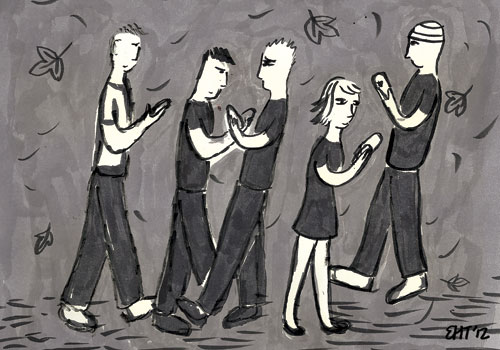Apple Inc. has based its design on a sleek, minimalist aesthetic. Let’s face it, Apple products look cool, which is more than half the battle in attracting customers to your brand.
Bad Apple?

Apple Inc. has based its design on a sleek, minimalist aesthetic. Let’s face it, Apple products look cool, which is more than half the battle in attracting customers to your brand.
As a result, Apple has developed a cult following, where people line up to get the latest, greatest version of the next iWhatever, first in white, then in black. Though for diehards (many of them students), the ethics of owning such a device are anything but.
Do you know where your iPhone was made? Who assembled your iPad? Probably one of 1.2 million employees working for Apple’s largest product manufacturer, Foxconn.
Three of Foxconn’s major factories located in Shenzhen and Chengdu, China, have been under fire for poor employee working conditions after a recent audit by the Free Labor Association, an independent organization that promotes workers’ rights by investigating companies to make sure they are adhering to international labor laws.
After 3,000 hours and 35,000 employee surveys, the FLA found 50 issues of noncompliance, the most egregious being the amount of hours employees worked.
The report, which can be seen online at www.fairlabor.org/transparency, stated that most workers exceeded the FLA code standard of 60 hours a week (including overtime), as well as the Chinese legal limits of 40 regular hours and 36 overtime.
In addition, many employees reported working up to 11 days in a row, and as the amount of hours worked went up, employees described less of an “attachment to factory and loyalty” as well as a decrease in “contentment.” Go figure.
Also, among the FLA’s issues that needed to be addressed were workers’ feelings of safety, dormitory living conditions and compensation. In all, 14 percent of employees were underpaid for overtime hours, and almost all had concerns about accidents occurring, like the aluminum dust explosion in Chengdu last year.
But statistics like these, though necessary for an independent investigation, can also remove the human element from the poor conditions being studied.
A slew of suicides in 2010, wherein 14 workers died, was the root cause behind the onslaught of attention Foxconn received. Mike Daisey, a popular monologue artist, also brought this issue to the public’s attention with his piece on “This American Life.” His account of the facilities mentioned attendants with guns and generally appalling living conditions.
Unfortunately, his version was falsified, drawing legitimacy away from the situation. But despite the embellishment of his story, the yellow nets outside workers’ dormitories speak for themselves. Wide swaths of netting encircle every building, taking on the appearance of fencing intended to keep workers in.
Indeed, the factories in Shenzhen—Longhua and Guanlan—are model cities in and of themselves. They have their own hospital, television network, grocery stores, banks and fire brigade, among other things. Nicknamed “iPod City,” the insistence on pulling a double shift is not lost on employees.
The real tragedy, though, is that this story is not unique.
Just 10 years ago, it was Nike getting called out on its factories overseas. And 10 years from now, it will be another corporation. This does not excuse the inappropriate conditions in which Apple products are made, but it is a relative drop in the bucket of outsourced mass production.
Granted, Apple is a large example, but their effort to join the FLA (which is voluntary) will hopefully lead competitors to make similar decisions.
Apple and Foxconn have at the very least admitted that there is room for improvement. One of the FLA’s stipulations is the addition of more suitable dormitories for existing employees and new buildings to accommodate the thousands of workers Foxconn has agreed to take on by 2013.
The addition to the workforce will ensure a steady rate of production, while alleviating the stress on the individual and drastically reducing overtime allowance. These changes will not affect employee wages, a condition the FLA will be auditing for the foreseeable future.
So for all you prospective Apples out there, as a possible result of Apple’s self-subjection to FLA audits, you might see a slight increase in pricing. But you’ll be able to use your iWhatevers with a better conscience now.




